There’s a famous Henry Kissinger quote, which apparently he didn’t even write.
Control oil and you control nations; control food and you control people.
Regardless of who wrote it, it’s a succinct way to explain what is happening in several nations, on different timescales, but all for the same reason and orchestrated by the same people.
Preventing Industrialization by Controlling Energy
To understand what’s going on, we must first understand the metric by which it’s being orchestrated: energy. When people think of energy they usually correlate it directly with electricity, which certainly is a huge part of the equation we are going to be talking about. But too often left out is food – and food, simply put, is energy for people. Calories. People eat food filled with calories to burn for energy to work. Simple. And it’s the same for machines. We put fuel into the machines to burn for energy to do work. The whole economy, humans and machines are burning fuel for energy to do work.
As we have seen with the Industrial Revolution, machines have been revolutionary and liberatory for human beings. They both saved us human labor and geometrically increased our output, creating vast amounts of wealth. Machines catapulted civilization to the next level of development. Not only are we wealthier, we live longer and there are more of us. We have gone from two to eight billion in about a century, and the Industrial Revolution is to thank for this. But it didn’t work alone—the Industrial Revolution laid the groundwork for the Green Revolution, another miraculous jump in human energy consumption. The Green Revolution, experienced over the middle of the 20th century, saw huge boosts in crop yield due to new technologies like farm machinery, artificial fertilizers and pesticides, and genetically modified organisms. We made so much food, Thomas Malthus didn’t just roll in his grave, he did a triple Lutz.
All of this new energy, for both human beings and the machines that serve them, created the perfect conditions for nation-building. But strong, growing nations of well-fed, hard-working and intelligent people are an existential threat to a certain group, dedicated to maintaining an empire. If this group was to maintain their empire they would have to control food and energy to prevent the process of nation-building, which would ultimately result in their demise.
This essay will explore two examples of where deindustrialization had been used as a geopolitical tool to maintain the Globalist Empire, two figures who have been instrumental in the execution of deindustrialization, the narrative presented to the public to obscure reality and the philosophy guiding these actions.
Economic Fallout in Two Island Nations
Cuba’s Economy in the Shadow of Soviet Collapse
In 1991 the USSR collapsed, causing ripple effects throughout the world. The former Soviet nations spent the years that followed in a downward economic spiral. Cuba, a small island nation only 100 miles south of the United States, also suffered tremendously economically. Prior to the collapse, the USSR was Cuba’s largest trading partner. Cuba was the largest exporter of sugar in the world, and with a nationalized industry, was able to prosper from its success. But this sugar did not just sprout magically from the ground. The industry boomed with the help of synthetic fertilizer, machines and factories powered by fossil fuels from the Soviet Union, a relationship essential to Cuba after the US implemented the longest running embargo in history on Cuba, which was started in 1962 by President John F. Kennedy and is still in place to this day.
From 1991 to 1993, Cuba saw a dramatic decline in GDP by 35%. It was dubbed the “Special Period in the Time of Peace.” During the Special Period, Cubans essentially experienced a famine: adults had an average daily protein intake of 15–20 g and lost an average of 5%–25% of their body weight.1
It was out of desperation that Cuba had to find an alternative to survive and keep what national sovereignty it had intact. No longer able to use fossil fuels to power their vital sugar industry, Cubans had no other choice but to “go organic” and produce food the old-fashioned way, without modern technological inputs.
Organic, a label despite its cache, has little to do with science, in fact you could even call it anti-science. The term “organic” doesn’t have a hard and fast definition – it is up to governing bodies to decide how much carbon-based pesticide and fertilizer (if any) is permitted in growing the crops to deem them “organic” or not. The term itself is scientifically misleading. In chemistry, organic refers to any chemical compound that contains carbon. According to chemistry, fossil fuel fertilizer and pesticide are “organic.”
It’s very clear to see that organic agriculture has nothing to do with modern science or technology, on the contrary, it’s specifically in opposition to these things. But the branding sticks, and by and large, people connote organic agriculture, sometimes referred to as “agroecology” as not only “more scientific” but more humane and progressive.
New Socialist, an online socialist magazine based in Britain, touts Cuba’s desperate farming methods as a “transformation to agroecology” claiming it “represents the world’s largest experience of socialist degrowth… Cuba has undertaken an agricultural revolution — an ecological movement touted as a potential model for the future we all face in the impending threat of the climate crisis.” And in a statement that would make the late anti-civilization, eco-anarchist Ted Kaczynski proud, New Socialist claims that “the agroecological movement in Cuba has reversed the alienation from nature inherent in industrialised agriculture.”2
The Guardian, another left-wing British outlet wrote a similarly sympathetic piece, coincidentally using the same featured source for the fluffy soundbites that New Socialist used:
“The way people thought about food and agriculture changed drastically with the special period,” said Miguel Angel Salcines, who runs a 25-acre organic farm in the outlying Havana district of Alamar, which started in those years. “Boats had arrived from the Soviet Union full of chemicals and fertilisers and suddenly there were no more boats from the Soviet Union, and people asked, do we need all those chemicals?”3
(emphasis added)
Both articles rely heavily on narratives from Organopónico Vivero Alamar, which is part of “Global Network of Lighthouse Farms” based in the Netherlands with a focus on achieving the UN’s Global Sustainable development goals. Lighthouse Farms is a project of Wageningen University & Research, a public university in the Netherlands specializing in life sciences with a focus on agriculture. Wageningen University also happened to be a target of the 2019 Dutch farmer protest that was a result of the government proposing a ban on nitrogen. The Dutch ban would effectively shut down a large portion of food-producing farms.
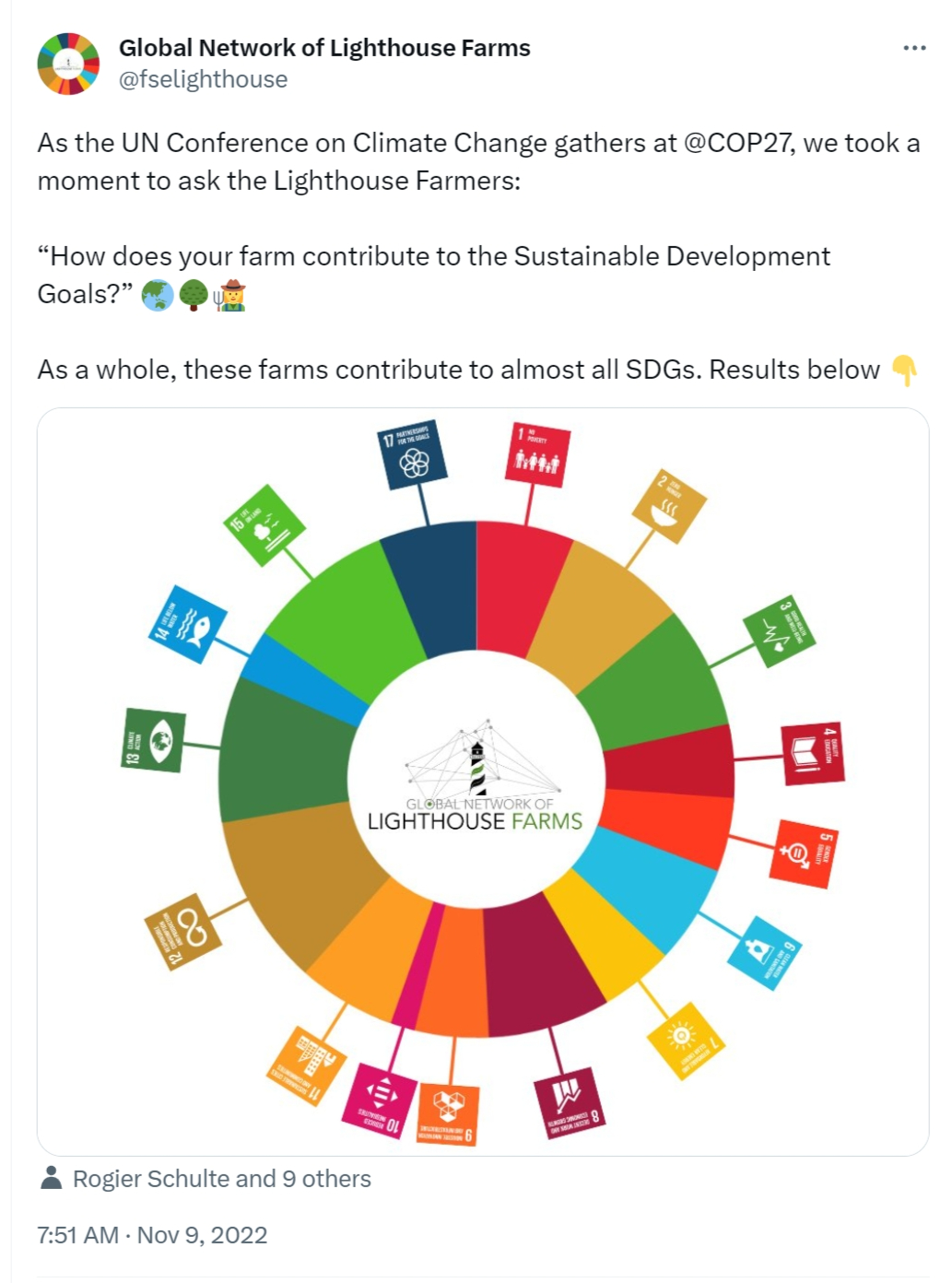
Organoponico Vivero Alamar’s record of being a shining example of Cuban agroecology goes back as far as 2006 when it was featured in a documentary titled The Power Of Community: How Cuba Survived Peak Oil. One would think that if organic farming was such a smashing success, the media would have more examples of Cuban farms to showcase to Western audiences at this point, and not have to keep relying on this one farm over and over as the example for what is supposedly happening all over Cuba.
But it isn’t just a socialist, leftist or liberal audience that is being catered to. Those who are more market oriented are served up another justification for brutally forcing Cuba to roll their nation back to organic agrarianism. In a 2016 Politico article titled U.S. companies make case for keeping Cuba organic, brutal, unnecessary sanctions by the US are framed as a market opportunity:
Opportunity flows out of decades of deprivation. Many Cuban farmers haven’t had access to the chemical pesticides and fertilizers prohibited under the USDA’s [organic] seal since the Soviet Union fell apart in 1991. Without the backing of the Soviets, Cubans couldn’t afford to buy even basic agricultural inputs, let alone the fuel to keep tractors running.
What the Washington-based Politico has conveniently left out is that this “deprivation” was (and still is) caused by the 60+ year US embargo on Cuba.
US lawmaker Chellie Pingree says “I think there will be a certain kind of cachet with not only an organic product but an organic product grown in Cuba,” while Kathleen Merrigan, director of George Washington University’s Sustainability Institute and a former USDA deputy secretary claims, “showing Cubans that potential now is important to try and preserve the island’s unique farming methods.”
But it isn’t just a market opportunity. Cuba is now a laboratory and research field for US experiments in organic food production.
The United States hopes to learn from the Cubans’ experience with organic production. The USDA and Cuban agriculture ministry signed an agreement during Obama’s visit last week that included calls for sharing information and research on organic farming practices.
It doesn’t take much reading between the lines to understand that Cuba’s “organic revolution” has not been one of choice, but rather out of necessity. And the more years that pass since the collapse of the Soviet Union, the harder it gets to justify the embargo on Cuba. The truth is that Cuba is being bullied via soft power coercion, championed by a gullible left-wing audience that has bought into the propaganda of climate change – that is, we must roll back human progress gained in both the Green and Industrial Revolutions in order to please Mother Gaia.
Organic Farming and Political Instability in Sri Lanka
There are parallels between Sri Lanka and Cuba and there are key differences. Both are island nations just off the southern coast of much larger countries (India and the US). Sri Lanka is a little over half the size of Cuba, but with twice the population. Like Cuba, Sri Lanka gained its independence, and later established a republic over the course of the 20th century. And just like Cuba, Sri Lanka has dealt with economic collapse, but this time it was not because a large socialist trading partner collapsed first.
Sri Lanka’s diplomatic relationship with the People’s Republic of China goes all the way back to 1952, when the two countries established the Rubber-Rice Pact. As historian Michael Roberts wrote in 2020, the pact was critical for both China and Sri Lanka in establishing an exchange of food and raw materials:
…Sri Lanka attempted to negotiate with the U.S.A. for a loan of US $50 million and for favourable prices [for] rubber exports and rice imports, but failed. The country was facing an unprecedented crisis: she could not find enough rice to feed her people and she had no prospect of a favourable market for her rubber exports.
It was in this grim setting that R.G. Senanayake, the then Minister of Commerce, played his stroke. He found out that China was prepared to sell rice to Sri Lanka in exchange for rubber. At that time China was unable to obtain rubber as a result of prohibition of rubber exports from Malaya following a U.N. resolution preventing the sale of rubber to China. Thus, China wanted rubber as badly as Sri Lanka wanted rice. R. G. Senanayake was quick to realize the mutual benefits of trade with China, and negotiated the Ceylon-China Trade Agreement or the Rubber-Rice Pact in Beijing towards the end of 1952.
History has shown that this was a deal that transcended a simple exchange of goods. In a press release celebrating the 70th anniversary of the agreement, Chinese Foreign Minister Wang Yi said that the pact “demonstrated our national spirit in the fight against hegemony and power politics,” that “China and Sri Lanka are good friends standing together with mutual assistance,” and that “Sri Lanka is an important part of China’s Belt and Road cooperation in South Asia.”
The 1952 deal was followed up in 1957 by Sri Lanka being one of the first countries to recognize the People’s Republic of China over Chiang Kai-Shek’s Taiwan.
Since then, China has helped bankroll Sri Lankan development, spending over $8B to finance airports, schools, ports, irrigation, coal power plants, and industrial parks, with major investments beginning well before the official start of the Belt and Road Initiative.
As Yi put it in 2021, “China will firmly promote high-quality Belt and Road cooperation and help Sri Lanka realize its “Vision of Prosperity and Glory.” We should further promote multilateralism, adhere to openness, inclusiveness and mutual benefit, oppose isolation, conservatism and zero-sum games, and jointly build a community with a shared future for mankind.”
It has been a longtime reality that stability in Sri Lanka hinges on their access to food; whether produced locally or imported from trade partners. As Henry Kissinger wrote to Richard Nixon in August of 1973, “serious food scarcities, added to already existing inflation, shortages, and other economic difficulties, might lead to unmanageable political instability” in Sri Lanka. And last year, political instability is exactly what they got.
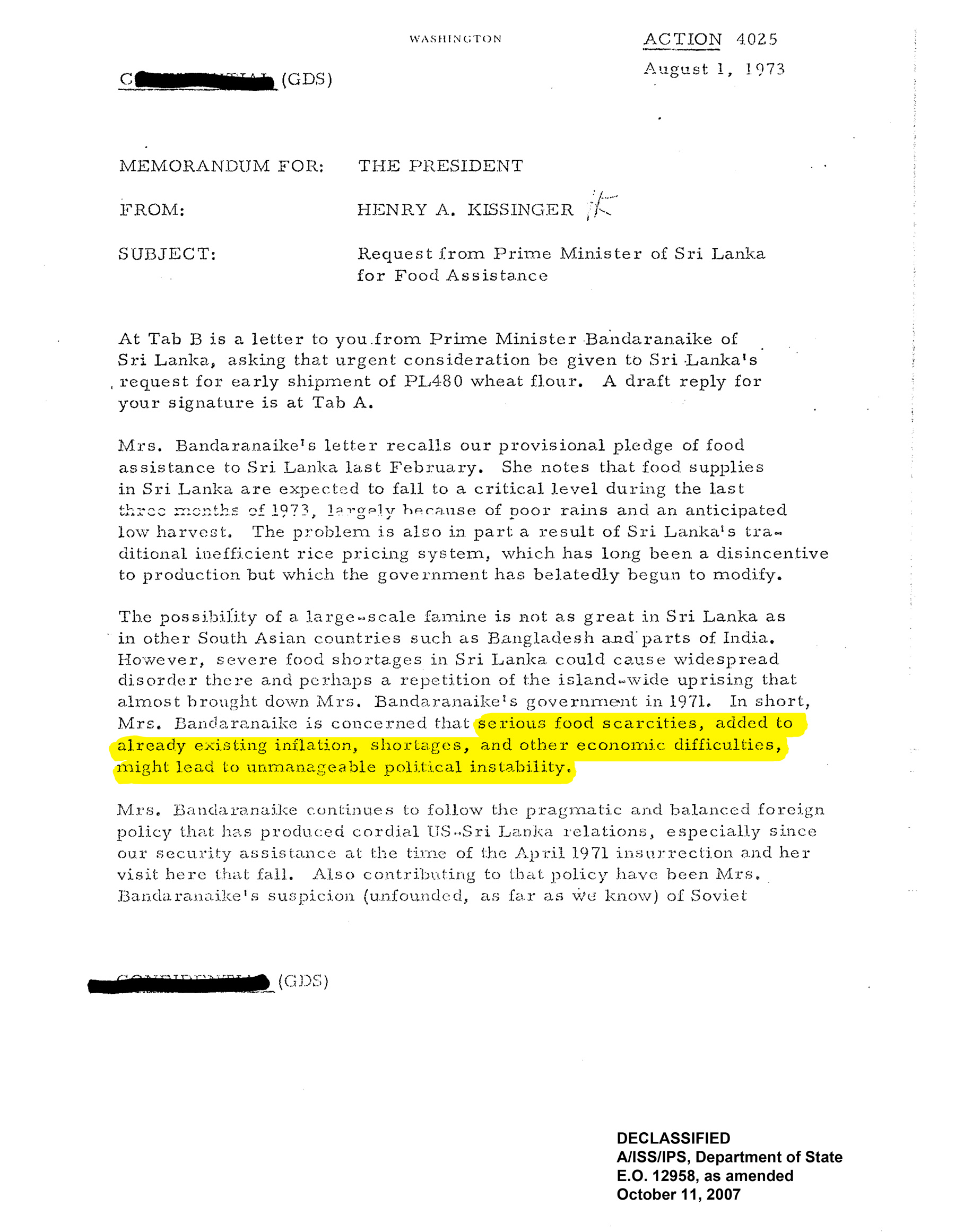
In 2019 President Gotabaya Rajapaksa announced his intention to transition Sri Lanka to fully organic agriculture over the course of 10 years. Then suddenly in April of 2021 Rajapaksa declared the country had to quit chemical fertilizers cold turkey. The results were devastating and threw the country into chaos. Sri Lanka’s backbone commodity, tea, suffered $425 million in losses. Millions were subjected to rolling blackouts and food lines. In March of 2022, less than a year after the 100% organic agriculture rule was imposed, riots broke out in Sri Lanka, resulting in President Rajapaksa fleeing the country after protesters broke through police barricades and into his house, demanding resignation. Just as Kissinger predicted, serious food scarcity was the fuel that created a fire of political instability.
Sri Lanka has since rolled back their policy on organic agriculture. Advocates of organic and “agroecology” place all blame on the fact that it was rolled out too quickly, and that they didn’t have time to adapt. If we look at the case study of Cuban agriculture, there is a kernel of truth to their position, especially if the ultimate goal is to “reduce human impact on the environment” even if that means human beings must live in poverty. Sri Lanka’s transition to organic was not “sustainable” – its political implications were much more overt and vulgar. Cuba’s transition has been much slower, over the course of decades, to the point where publications can claim that they are doing so out of choice, or that they have achieved “the world’s largest experience of socialist degrowth.” For eco-socialists, Cuba is a success story, Sri Lanka, not so much.
Key Figures Who Influenced Governments to De-Develop their Own Industries
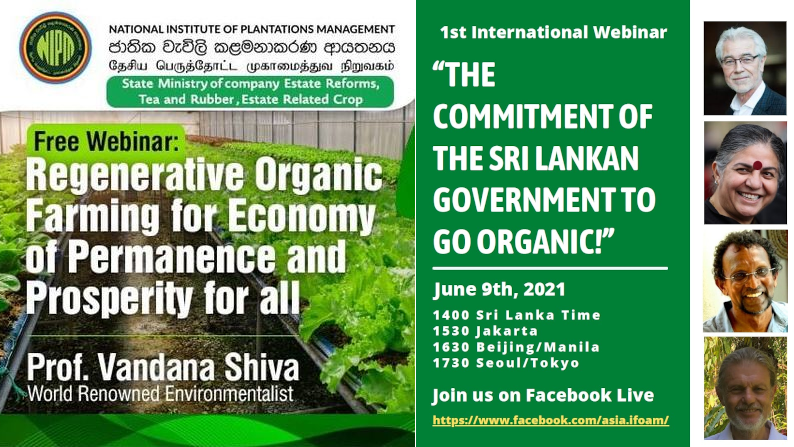
Gandhi of Grain, Vandana Shiva
Agriculture experts within Sri Lanka tried to warn the government against their organic adventure but were ignored, passed over for the outsized influence of a multinational civil society.
“The reason I am glad about the approach of the Sri Lankan government is because it connects three things, namely stopping dependency on imports, non-sustainability and the ruination of the ecosystems and of health. The minute we connect sustainability and health, organic becomes the only way we can move forward,” a direct quote from Dr. Vandana Shiva on her website Navdanya International in an official press release following the decision by the Sri Lankan government to ban importing chemical fertilizers, pesticides and herbicides and to replace them with organic inputs and methods. She is said to have a major influence on the decision.
Vandana Shiva has a mercurial reputation. Amongst well-to-do Westerners, she’s been called “the Gandhi of grain,” compared to Mother Teresa, or as Bill Moyers stated, she has become a “rock star in the worldwide battle against genetically modified seeds.”4 Her reputation amongst other experts in the field is not so rosy though. When her colleagues, despite any ideological alliance, begin to defect after uncovering the facts that disprove Shiva’s pseudoscience, Shiva’s claws come out. When environmentalist Mark Lynas changed his mind on the use of biotechnology in agriculture, Shiva ruthlessly attacked him on social media, invoking rape to defend her position and mar a fellow traveler.
“#MarkLynas saying farmers shd be free to grow #GMOs which can contaminate #organic farms is like saying #rapists shd have freedom to rape.” The message caused immediate outrage. “Shame on you for comparing GMOs to rape,” Karl Haro von Mogel, who runs Biology Fortified, a Web site devoted to plant genetics, responded, also in a tweet. “That is a despicable argument that devalues women, men, and children.” Shiva tweeted back at once. “We need to move from a patriarchal, anthropocentric worldview to one based on #EarthDemocracy,” she wrote.
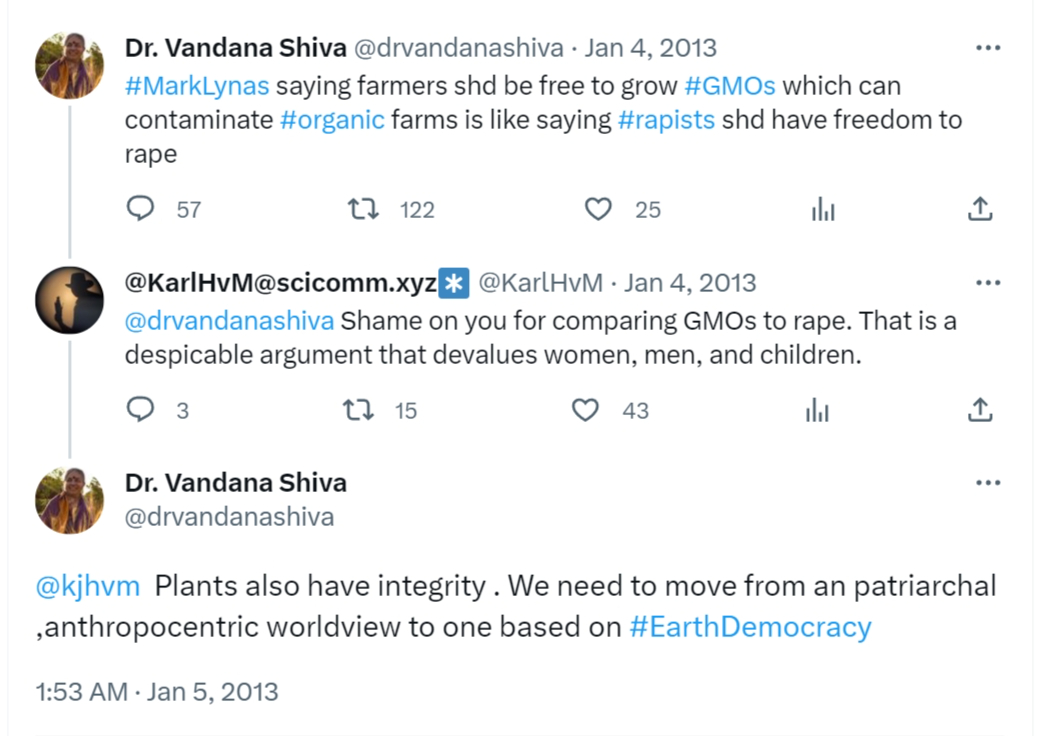
Shiva is not shy with her use of demagoguery and histrionic comparisons. (It would be easy to argue it is her main talent or useful attribute for the interests she serves.) She believes the Green Revolution was a violent one, and that “by shifting the focus of farming from variety to productivity, the Green Revolution actually was responsible for killing Indian farmers” despite the fact that the exact opposite has been proven. Millions would have starved to death in India, had it not been for the Green Revolution. Perhaps Shiva was channeling Malthus’ disappointment from beyond the grave.
When reading Shiva’s work, one is bombarded with capitalized phrases like Big Food and The Poison Cartel, with very loose factoids and statistics scattered in between. What Shiva is selling is very clearly ideology dressed as science without any actual concern for it.
While most organic farming advocates will admit that their method is not capable of feeding the world, and are well aware of the method’s limitations, Shiva is relentless in asserting that it is. And her fortitude has paid off—thanks largely to Shiva and her Navdanya NGO, India does not allow the use of GMOs except for cotton. And if she had gotten her way, fertilizer would be banned as well.
“Fertilizer should never have been allowed in agriculture,” she said in a 2011 speech. “I think it’s time to ban it. It’s a weapon of mass destruction. Its use is like war, because it came from war.”
How do shameless charlatans like Shiva gain access to megaphones and foundation funding? The answer is as old as time itself, having friends in high places (royal highness, even) counts for a lot.
[King] Charles, perhaps the world’s best-known critic of modern life, has for years denounced transgenic crops. “This kind of genetic modification takes mankind into realms that belong to God and God alone,” he wrote in the nineteen-nineties, when Monsanto tried to sell its genetically engineered seeds in Europe. Shiva, too, invokes religion in her assault on agricultural biotechnology. “G.M.O. stands for ‘God, Move Over,’ we are the creators now,” she said in a speech earlier this year.5
Shiva’s alliance with King Charles, King of the United Kingdom and 14 Commonwealth Realms (of which India and Sri Lanka were former subjects) is more than just ideological. Though it is very much that. Charles keeps a bust of Shiva in his prized Highgrove Gardens, dedicated to people who’ve influenced him in a display known as the “Wall of Worthies.” Shiva is more than willing to act on their shared goals, specifically the demand of “combating climate change” by “degrowing” the world economy.
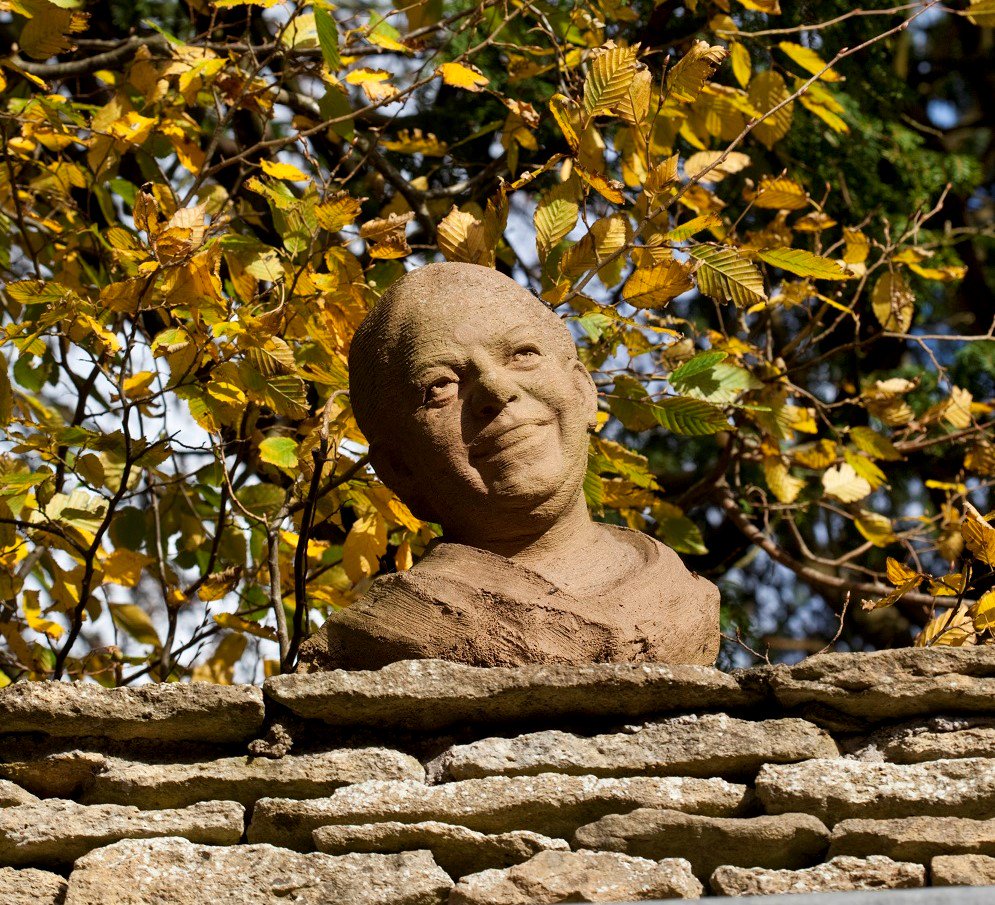
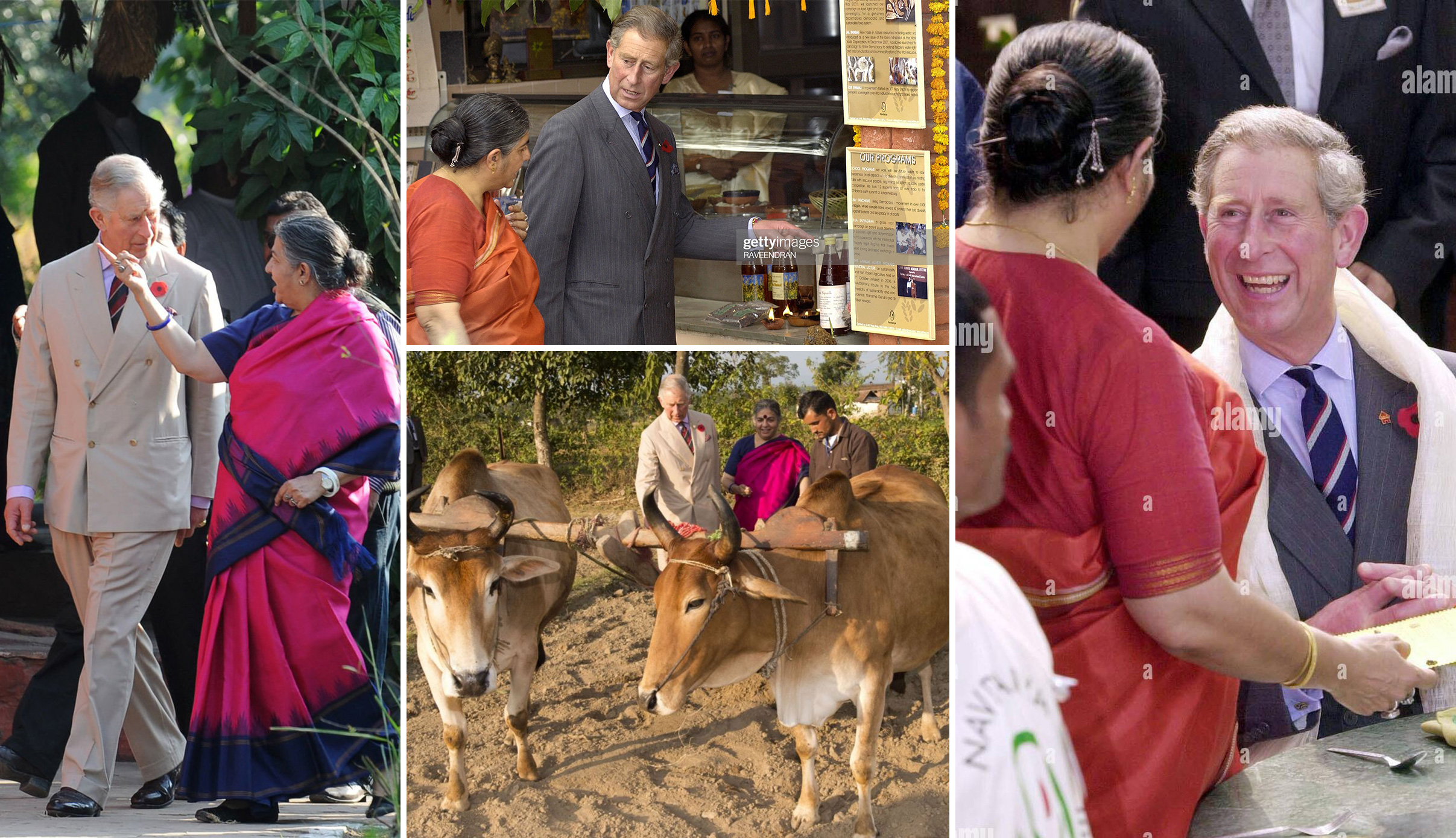
It was revealed in 2019 in an Indian state Intelligence Bureau report that Greenpeace, among other environmental NGOs, were coordinating a mass effort to halt energy and agricultural development projects. And they had successfully done so to the point that India’s GDP growth took a 2-3% hit. Five activists were called out specifically by name and Vandana Shiva topped the list. She was credited with being at the forefront of the anti-GMO movement, doing this work both under her Navdanya Organization and as a consultant for Greenpeace Australia.
As a result the Indian government banned foreign funding of local civil society organizations, warning that international influence was “spawning” mass movements throughout the country which posed a threat to their national economic security.6 According to information in the report, they had every reason to do so. The report states:
A significant number of Indian NGOs (funded by some donors based in US, UK, Germany and Netherlands) have been noticed to be using people centric issues to create an environment which lends itself to stalling development projects. These include agitations against nuclear power plants, uranium mines, Coal-Fired Power Plants (CFPPs), Genetically Modified Organisms (GMO), mega industrial projects (POSCO and Vedanta), [hydro] projects (at Narmada Sagar; and in Arunachal Pradesh) and extractive industries (oil, limestone) in the North East. The negative impact on GDP growth is assessed to be 2-3% p.a.
The report points specifically to anti-nuclear activism in 2011 that threatened the soon-to-be commissioned, Russian-assisted Koodankulam Nuclear Power Project in Tamil Nadu. In the aftermath of the protests, even India’s Minister for the Environment Prakash Javadekar asserted India had a “right to grow” and that “unless we eradicate poverty, we cannot really address climate change.”
In 2013, King Charles (then Prince), along with his wife Camilla, toured India for nine days which included a full day at Navdanya organic farm and education center in Dehradun. “Charles spent nearly an hour in the company of Dr Vandana Shiva as he toured the site that promotes biodiversity, organic farming and the process of seed saving.”7 After the nine days were up, the Royal couple moved on to tour Sri Lanka.
The Indian intelligence report also spoke to how civil society, non-governmental organizations, activists, academics and media work together to sway governments and national policies:
A small group of activists and NGOs have at times succeeded in shaping policy debates in India. Apart from that, in some cases it is observed that in a cyclic process, an NGO is set up, funds are obtained and, slowly, with the help of the media, an image is created. And then awards are procured from foreign countries to enhance the image, after which Government machinery finds it that more difficult to act against the awardee.
This description very clearly demonstrates what happened in Sri Lanka last year, or even what has been happening slowly in Cuba over the past thirty years. Shiva was one of, if not the leading character in both Sri Lanka and India’s economic sabotage. But we have to introduce a new character if we want to understand how things played out behind the scenes in Cuba.
Litigious Environmentalist, Robert Kennedy, Jr.
This spring Robert F. Kennedy, Jr, nephew of President John F. Kennedy announced his run for POTUS. The candidate touts an anti-war, anti-corruption message. But little emphasis, if any, is put on his life’s work, how he has spent his career over the last 30+ years. RFK Jr. has been a prolific environmental lawyer for some of the largest NGOs including Natural Resources Defense Council, and even created one of his own international NGOs, Waterkeeper Alliance which is active in 47 countries. In 1999 he was named by Time Magazine as a “Hero of the Planet.”
One of, if not the crowning achievement of Kennedy’s career has been the shutdown of Indian Point Energy Center, a three unit nuclear power facility that provided New York City with a quarter of its power. “Nobody has been more important to Riverkeeper than Bobby Kennedy,” said Riverkeeper President Paul Gallay. In 2017, Spectrum News reported that, “Kennedy was an influential part in working to shut down Indian Point by 2021.” Kennedy stated that the win to close Indian Point was an important milestone for his career.8
The results for New York have not been as dire as Cuba or Sri Lanka, but nonetheless, have been negative for residents of the state (including myself). Since the closure of Indian Point in 2021, we’ve seen our electricity bills skyrocket. In winter of 2022, I received a whopping $1000 bill. The utility company Central Hudson issued a press release stating the closure of Indian Point as the top reason for the price spike “the closure of Indian Point last year increased the region’s reliance on natural gas for power generation.”

Kennedy likes to claim that he is not anti-nuclear. He says that if you can make it competitive in the market and safe to operate and insure, then he would not be opposed to it. This very fair sounding statement lets him off the hook to the sympathetic layperson. Most people give the handsome, charming “truth-telling” nephew of the beloved American martyr, President JFK, the benefit of the doubt. But Kennedy is reviled within the pro-nuclear community because they can very quickly identify his false and fear mongering talking points, not unlike how experts in the field have disdain for Vandana Shiva’s absurd, anti-scientific claims about synthetic fertilizer and GMOs.
Kennedy shares other similarities with Shiva. Spanning the late 1980s to the early 2000s, Kennedy worked under the banner of “indigenous rights” to halt mega industrial projects, extractive industries and energy projects in South America and Canada, much like the way Greenpeace was reported to have done in India. It should not come as a surprise, then, that RFK Jr.’s anti-nuclear exploits did not begin in the great US of A, but in Cuba in the early 1990s.

In 1996 the NRDC together with Citizens Energy Corporation (an NGO based out of Massachusetts founded by RFK Jr.’s older brother Joseph II) organized a U.S. delegation to Cuba which included both RFK Jr. and his younger brother Michael to “discuss Cuba’s energy needs and urge Castro to abandon his nuclear program in favor of safer energy sources.”
Castro, who has stubbornly maintained that his energy-starved nation needs the plant, told U.S. environmentalists and energy conservation experts that he will look into their suggestions for harnessing energy from sugarcane plants, Robert Kennedy Jr. and Michael Kennedy said Monday.
Michael Kennedy said that during an earlier 1991 meeting with Castro, the leader vigorously defended the right to build a nuclear power plant in his country.9 The late Michael Kennedy, was chairman of his older brother’s Citizens Energy Corporation, a Boston-based NGO that “promotes the development of alternative energy resources and has been active in the third world.” Citizens Energy began in 1979 with oil-trading ventures in Latin America and Africa, and used revenues from commercial enterprises to channel millions of dollars into charitable programs in the U.S. and abroad. Michael first met with Castro in Cuba to discuss his nuclear energy plans in January of 1991, eleven months prior to the collapse of the Soviet Union.10
In 1976 Cuba signed an agreement with the Soviet Union to construct the Juragua Nuclear Power Plant consisting of two 440-megawatt reactors, utilizing the VVER design (a more advanced and safer design than Chernobyl used). The plant was slated to deliver 15% of Cuba’s energy upon completion and reduce its dependence on imported oil. Construction began in 1983 and was scheduled to be operational by 1993. The collapse of Cuba’s Soviet allies forced the project to stop in 1992, and by 2000 the project was abandoned completely, despite Russian President Vladimir Putin’s efforts to restart the project.
There’s no telling how much less suffering would have occurred during Cuba’s Special Period if they had cheap, abundant and safe nuclear energy. Robert Kennedy, Jr. in his meeting with Castro, insisted that the plant was too dangerous to build and that the island nation should instead burn discarded sugarcane plants for energy. Some today refer to this as “renewable biofuel.” In a 1996 interview with Charlie Rose, Kennedy stated:
“If you burn that cane in high efficiency turbines that you could provide all of the energy needs for Cuba for the foreseeable future, you could do it at a fraction of the price that they’re putting into this nuclear power plant.”11
As of 2014, Cuba was getting only 4% of its electric generation fuel from Independent Power Producer (IPP) oil which includes biodiesel from sugarcane biomass:
Investment in [biogas] was less successful. Without support from the Soviet Union and with a shrinking economy, Cuba saw a huge collapse in sugarcane production. Production fell 57.4% from 1989 to 2000, and the downward trend has continued. As a result, the proportion of electricity for primary consumption produced by [biogas] has likewise fallen.12
Contrary to RFK Jr.’s promises, burning sugarcane was not a substitute for nuclear energy as Cuba still deals with crippling blackouts and energy shortages to this day. As of January of this year “electricity is being rationed in Cuba, with daily life dominated by power outages that can last up to 18 hours a day.”13
Shiva & Kennedy, a Close Friendship and Shared Ideology
“Let me introduce my hero Vandana Shiva. Who I’ve known for many, many years, who has been a role model for me, really,” said RFK Jr., introducing Shiva on his show TRUTH With Robert F. Kennedy, Jr. “I’ve been hanging out with you for many many years, I don’t even remember the first time we met.” Indeed, it’s clear that Kennedy and Shiva are thick as thieves and have collaborated for a long time in their quest to rid the world of fossil fuel fertilizer and GMOs.
I would not argue that either of these people are conventionally smart (I don’t think the vast majority of intelligent people purposefully spread lies), but what they lack in intelligence, they make up for in charisma, or at least, they appeal to people who are “searching for the truth” in a world where they know they are being lied to in one way or another.
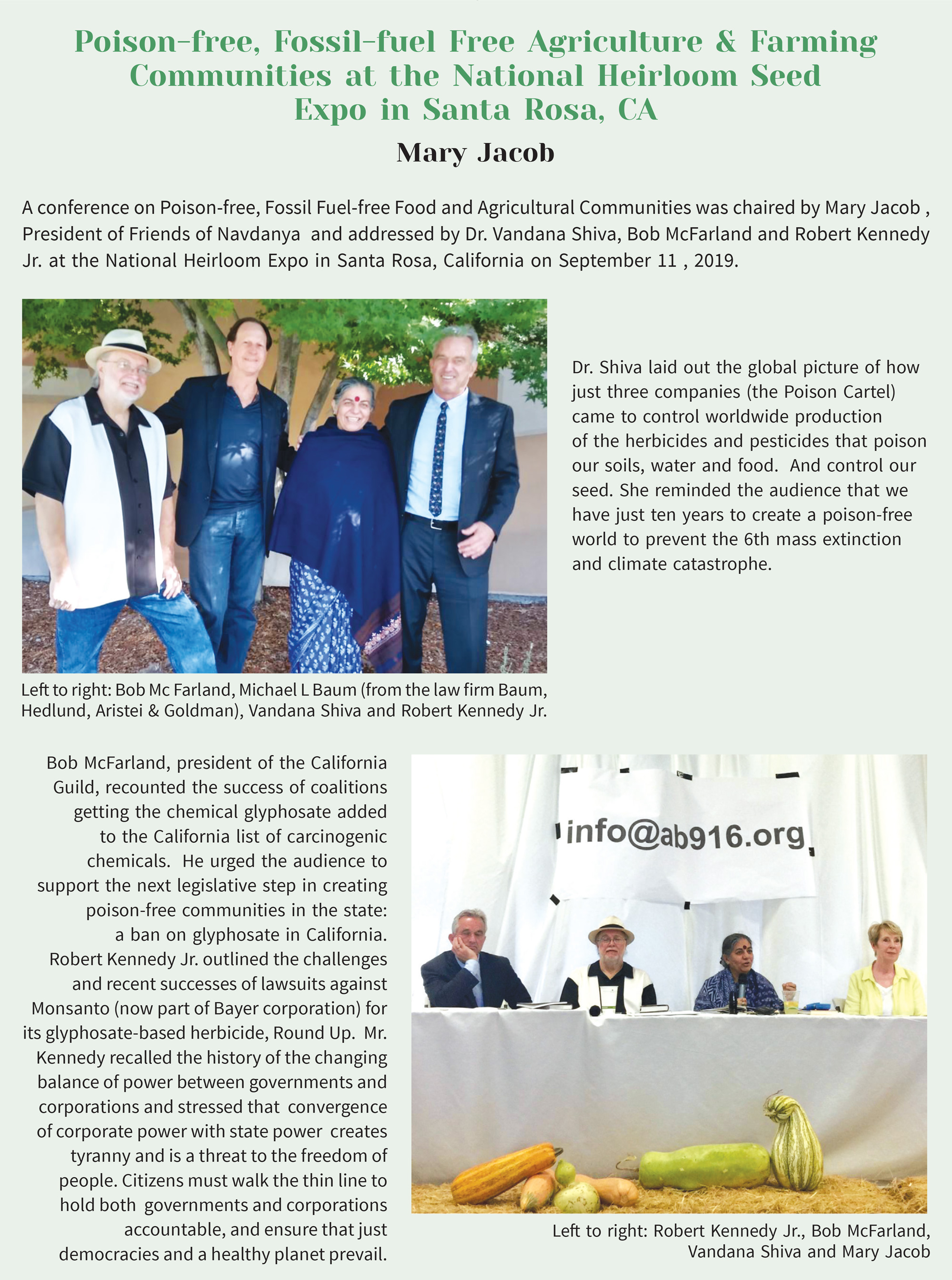
These two mirror each other in their activist resumes, using NGOs to prevent development, especially in the third world. They both play the archetype of “truth teller” fighting “the man” and appeal to the same audience. But more fundamentally, they agree on the same moral rationalization of their actions. They operate on the same underlying philosophy. To illustrate what that philosophy is, let us look at a major contradiction in their rhetoric.
“I want to talk to you about Bill Gates,” Kennedy says to Shiva, “about his theft of seed and his purchase of the land; and his move to create a new feudalism on this planet, and get the farmers off the land and the billionaires on to it.”
Feudalism was an era defined by serfdom. Serfs were agricultural workers who were indentured to the land. The transition to capitalism was hastened by the industrial revolution, which liberated tens of millions of people from working on the land for subsistence. Put another way, growing food and producing goods became easier with fossil fuel powered machines. ‘Getting farmers off the land’ is actually a move away from feudalism, not towards it.
When Kennedy says farmers will be replaced by billionaires on the land, he’s doing a linguistic sleight of hand. Do you think the billionaire would operate on the land the same way the farmer would? Of course not. The billionaire would use machines, technology, and hired labor to do the work, whereas the farmer would have to dig in the soil himself (or buy machines, hire labor, etc.) But that, itself, is the problem. Wealth. That’s the only difference between Bill Gates and Bob Farmer, one is wealthy and the other is not. If you are a human being, farming on land (for sustenance or wage, not by choice) you are not wealthy. But you should be – society should raise the wealth of all people, not just a few. The only way to liberate people from the land is through technology and wealth – industrialization.
Shiva and Kennedy are fundamentally opposed to industrialization. Kennedy’s bio has touted that he “has been the recipient of numerous awards, mainly for his environmental work… for his success helping Riverkeeper lead the fight to return much of the Hudson River to its pre-Industrial Age splendor.” Pre-industrial age splendor has translated directly to higher electricity bills and less jobs for the average Hudson River valley resident.
In a 2021 interview Shiva states:
“As I went more deeply into the research, I understood that what we call “science” is really a narrow point of view, which is driven by an old conception of ‘ownership of nature.’ It’s the ideology of the start of the Industrial Revolution: during this period combustibles and fuel was needed, and the conception of ‘ownership of nature’ served the tree-cutters. Something similar happened later, with the geological research that served the interests of the owners of the mines and the cement industry.”14
Science, as Shiva understands it, was driven by a philosophy of ‘ownership of nature’— an ideology which she credits with starting the Industrial Revolution. This idea, that the common man has an inherent right to rein in nature – which is more than willing to maim and murder him – for his well being was the idea that drove science and technology to move people off of the land, away from subsistence farming and towards happier, healthier and longer lives. But this notion is reprehensible to people like Kennedy and Shiva, who believe that nature is not only distinct from mankind but that it deserves special protection from human beings. These nature worshippers believe that mankind is a virus on the planet.
King Charles’ father, Prince Philip famously stated that he would like to be reincarnated as a deadly virus to help solve human overpopulation. He elaborates on this in a forward he wrote for a 1986 book called People as Animals:
I just wonder what it would be like to be reincarnated in an animal whose species had been so reduced in numbers that it was in danger of extinction. What would be its feelings toward the human species whose population explosion had denied it somewhere to exist… I must confess that I am tempted to ask for reincarnation as a particularly deadly virus, but that is perhaps going too far.15
It’s very clear why the British monarchy would despise technological and industrial development that leads to bigger and healthier human populations. The royal family relates to an endangered animal going extinct! In order to preserve the status quo, they must halt development at all costs. They would rather have everyone be poor, and work the land for $2 a day. Are we starting to see why one of the last remaining (and by far the most oligarchic and destructive) Western monarchies loves Shiva so much?
All of this ideology is disseminated and justified to the general population as fear of technology. World War 2 gave us the atomic bomb, the greatest evil mankind had seen up to that point, but this technology was turned into the greatest good-the most potent fuel, nuclear energy–mankind has ever discovered. Similarly, Shiva rightfully condemns the chemicals and fuel used in WW2 as evil, but then throws out the baby with the bathwater by saying that the Green Revolution–the technology that saved millions of lives by basically ending famine–was a continuation of the Nazi experiment. It’s the job of Shiva, Kennedy (in the vein of Ted Kaczynski) to redirect the public attention away from the ruling elite like King Charles who would like to depopulate the earth, and reroute people to see technology itself as inherently evil. But they aren’t alone in this work, entire industries, both commercial and NGO are built around perpetuating this anti-human narrative.
How they sell their ideology to you
Commerce, with its accompanying marketing and public relations (PR) has been the most effective agent of information warfare in the 20th and 21st century. The slogan “you are what you eat” became a marketing phrase with the subtext of “you are what you buy” which was then summed up in Barbara Kruger’s 1987 work I Shop Therefore I Am, a critique of consumerism and a play on French philosopher René Descartes’ famous quote “I think, therefore I am.”
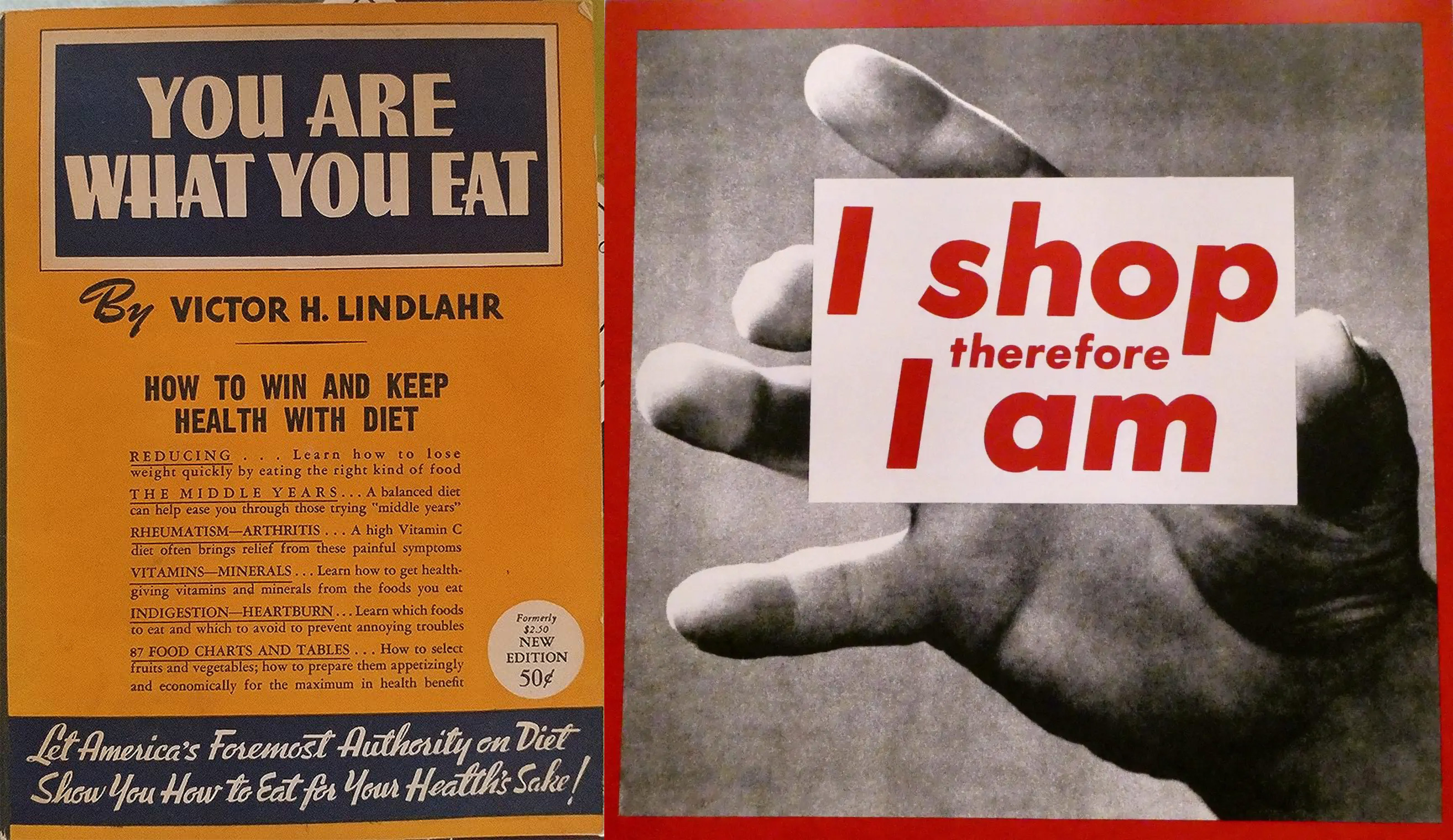
Last year I was struck by a meme that landed directly at the intersection of food, marketing, social media and information war. A tweet captioned “which way western man?”—a meme phrase based off of a 1978 book by white nationalist author William Gayley Simpson, similar to the “Reject Modernity, Embrace Tradition” meme16 —along with an infographic comparing two different hamburger patties. The left side, “Plant-based, lab stuff” with the descriptor “supports monocrops & corporate patents” and has a long list of ingredients, all sitting on top of a background image which features a tractor tilling a field. The right side, “Regenerative beef” features the descriptor “crafted by nature in thriving ecosystems” has a single listed ingredient “100% grass fed beef” and sits on top of a background image featuring serene grasslands.
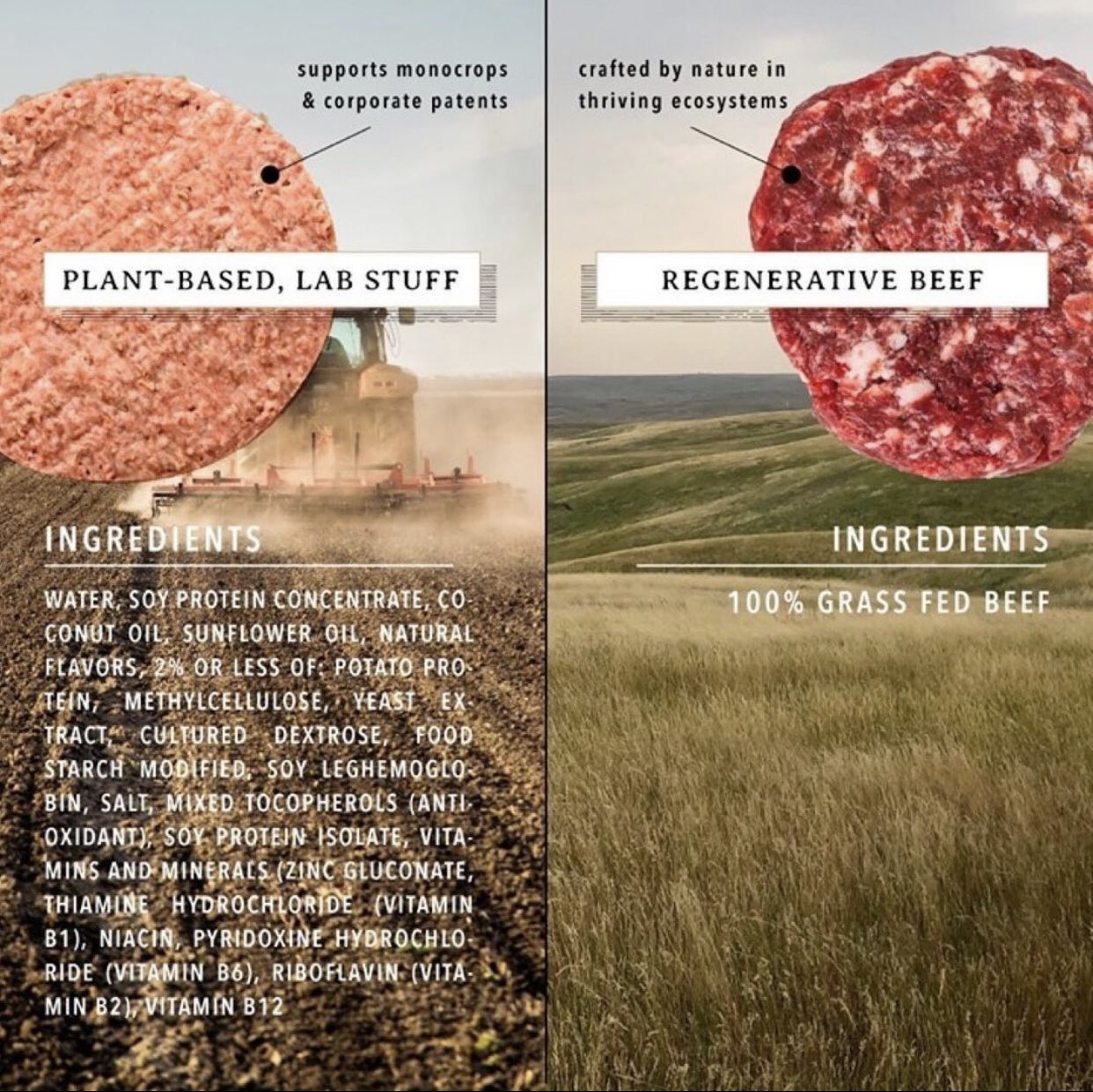
The meme, it turns out, originated from the instagram account of a company called Force of Nature Meats, started by Taylor Collins and Katie Forrest, who sold their first business, Epic Provisions, to General Mills in 2016 for $100 million (valued at five times their $20M revenue).17
Force of Nature’s instagram account is full of inspirational quotes from environmentalist heavyweights like Wendell Berry to David Suzuki about the ills of industrial farming and the importance of soil health, and phrases like “INDUSTRIAL AGRICULTURE IS BROKEN” superimposed over images. If you are unfamiliar with the term “romantic agrarianism” look no further than their instagram account. Though there are some typical, apolitical food marketing posts like recipes and glossy product shots, there’s almost a disconcerting amount of hyper-political posts mixed in. One from September of 2022 features a USDA graph Farms, land in farms, and average acres per farm, 1850-2021.
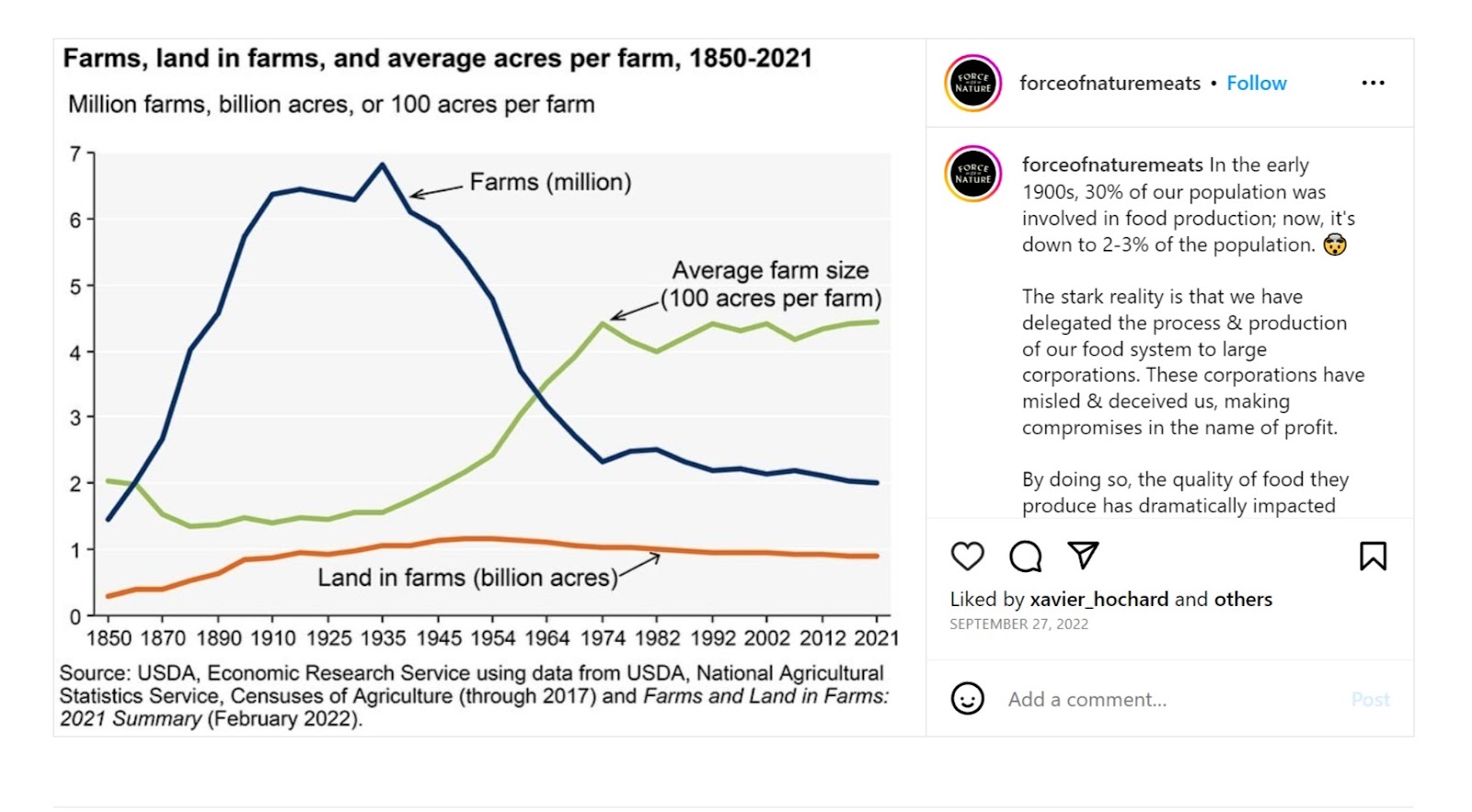
The caption reads:
In the early 1900s, 30% of our population was involved in food production; now, it’s down to 2-3% of the population. 🤯
The stark reality is that we have delegated the process & production of our food system to large corporations. These corporations have misled & deceived us, making compromises in the name of profit.
By doing so, the quality of food they produce has dramatically impacted the consumer, not only in terms of quality but reliability, and nutrient density.
As a population, we have been obedient to their power for too long. Corporate behavior is driven by compromise. We must DISOBEY and redirect the course.
Don’t be complicit to a system you’ve been fed to believe has your best interest in mind when clearly they do not.
At Force Of Nature, we are building the resiliency & fertility into our land and ecosystems that address the impacts of climate change, the health of our topsoil, and human nutrition.
Sovereignty starts with becoming an independent thinker, signaling to the industry what we value and why it is imperative to the state of our agricultural affairs.
Please visit our website to learn more about what Force Of Nature is doing to DISOBEY the industrial agriculture complex!
After reading that, it’s hard to remember whether we’re being recruited to a government-lobbying NGO, or buying beef jerky. Part of me starts to wonder if the sale of jerky is not the main goal here. I can’t help but hear the echo of Shiva and Kennedy’s voices. From an interview on Kennedy’s The Defender Show titled Vandana Shiva on Agroecology and Feudalism Kennedy says to Shiva (while talking about their favorite villain, Bill Gates):
The Green Revolution was a brainchild of the Rockefeller Foundation, and it was a way to supplant local subsistence, traditional agriculture with chemically-based agriculture, heavy duty pesticides, heavy duty carbon-based fertilizers, big machinery, etc. with the claim that ‘we’re going to feed the world.’ It has been taken over since, by the Gates Foundation with these methods of bringing in Kraft Food and McDonald’s and Cargill and these big corporations that he is invested in–and Monsanto, of course, where he is one of the biggest investors–to create supply chains and to force those governments to force on people chemically based agriculture that enrich corporations in which he personally is invested.
For all three, the beef jerky consumer brand, Force of Nature, Vandana Shiva and Robert Kennedy, Jr., big corporations using machines and technology to produce an abundance of food while freeing people from back-breaking subsistence farming is the problem (not the fact that a minority of people control the wealth and abundance created by this technology at the expense of others).
It should come as no surprise that Force of Nature features a quote from King Charles on their Instagram page:
“We have an absolute responsibility to the next generation to enable a shift towards methods of food production which are working in harmony with nature.”
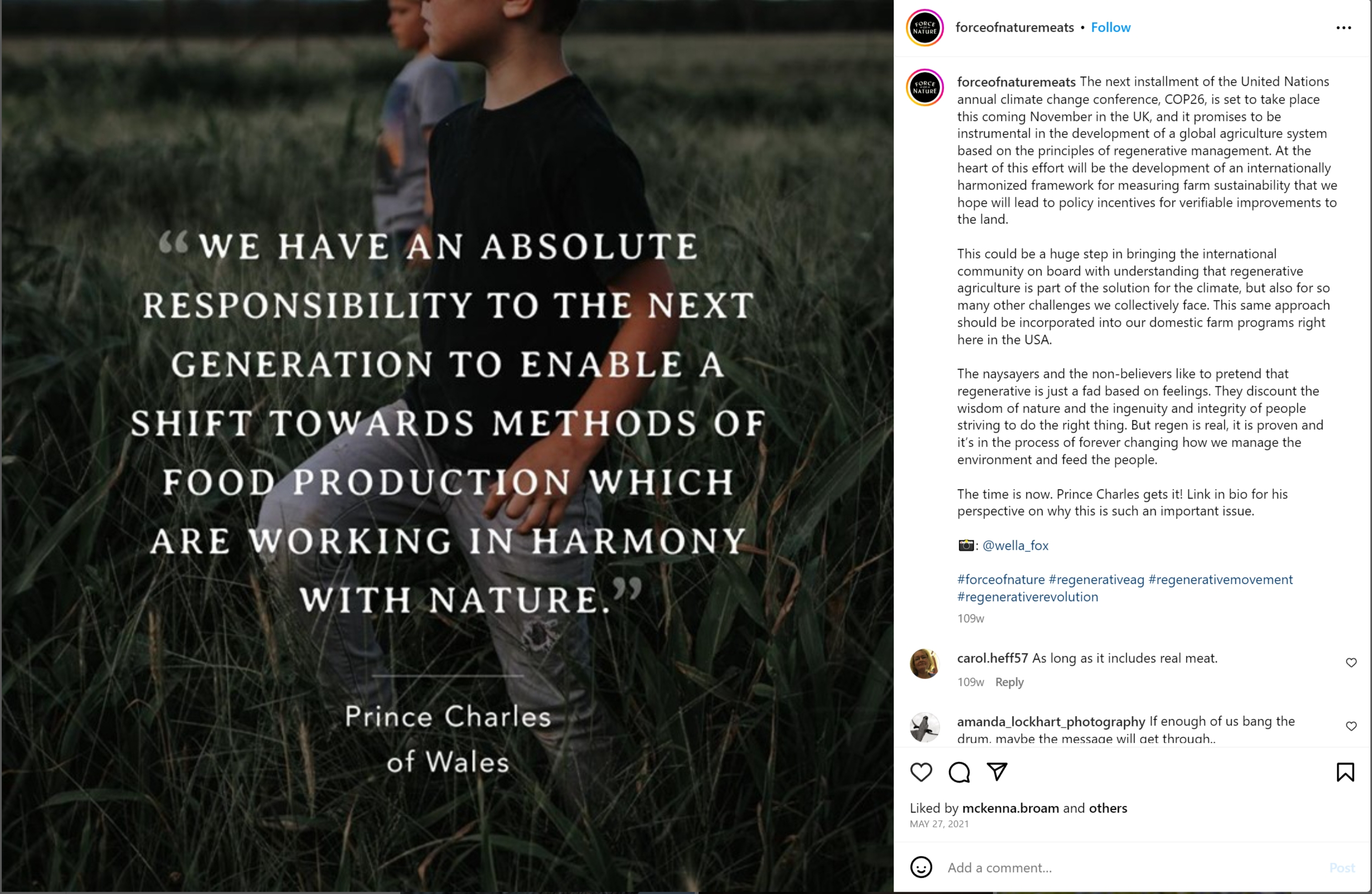
Force of Nature Meats corporation is a perfect case study in how civil society works hand-in-hand with the private market sector to push the exact same agenda and ideology. There is virtually no difference between buying their jerky or becoming an activist, just as there is little distinction between Force of Nature, Navdanya International or Waterkeeper Alliance, except maybe how they are taxed. It’s all ideological enrollment in a program that’s meant to prevent international development and encourage domestic de-development. They are all selling an ideology to the public that is inherently anti-progress and anti-human, while wearing a persona that paints them as the exact opposite—the rebellious truth-teller, fighting for the little guy against Big Food.
A Different World is Possible
Globalism is often used as shorthand for the “big bad.” And there is a lot of truth to it. The people who meet at Davos and put on the World Economic Forum, the United Nations and their “Sustainable Development Goals” are very much at the center of what is happening in the larger international game of de-develop, divide and conquer. But many of the most vocal critics of globalism are playing the role of controlled opposition. Without understanding the anti-human philosophy that runs through globalism, regenerative, organic agriculture, or “agroecology” we become boxed into a false struggle, neutralized and unable to change the world in a positive way.
Cuba and Sri Lanka have both been disciplined by agents of empire for daring to step out of line and for partnering with superpowers, like the USSR or China, who are seen as existential threats to said empire. In 2001, Granma, the official newspaper of the Central Committee of the Communist Party of Cuba published a column about Putin’s recent visit to the country to discuss the Juragua nuclear plant and other energy projects. The piece was countering media slander about Cuba/Russia relations and spoke of the deep respect and friendship the countries had, despite economic hardships:
Only one distinction should be made: first the Soviet soldiers, and later the Russian soldiers, were always our friends. They were here alongside us with our consent and willingness. They were perceived as a symbol of internationalism, or of friendship and trust. The system had changed, but they remained the heirs of the victors over fascism.
The author goes on to describe the nature and historical context of the meeting. It is clear, if we read between the lines, that purposeful economic destruction and de-development had not only put the respective nations’ sovereignty in danger, but also strained their ties:
It was with regard to economic matters that Putin’s visit turned out to be a disaster, but through no fault of his own. Ten years had passed. His country had been ravaged by a hurricane of plunder and theft. Everything was left in chaos. A swarm of cunning plotters and advisors had moved in from abroad or risen up from the fertile ranks of opportunistic Russian politicians who divided up and stole everything there was to steal.
Although we were fully aware of what had happened, our task was not to pass judgment, but rather to seek out everything that remained of what was good, worthy and honest in that country, for whose sons and daughters our people felt and still feel such affection, admiration and fondness.
Nevertheless, the crushing weight of ten years, the suffering and deprivation that we had been obliged to endure here and the chaos that reigned over there, had changed absolutely everything.
At the time of the collapse of the Soviet Union, Soviet-Cuban cooperation was fundamentally focused on three industrial sectors: nuclear power development, investment in the development and production of nickel, and oil refining.
…
The group accompanying Putin showed particular interest in the three investment projects outlined above. This was only logical, since the Russians of the former USSR had been involved in those projects. However, in the last 10 years there had been no cooperation between Russia and Cuba whatsoever and nobody gave a thought to whether we still existed or how we still existed. For many years we had to endure our ordeal alone, bearing the heavy weight of the cross on our backs.
Under these circumstances, how could anyone be so cynical as to claim that we turned down offers from Russia in favor of million-dollar deals with Western countries?
Can they possibly be unaware of the fact that we have spent over 40 years subjected to a rigorous blockade and economic war that obstructs investment and impedes our development?
This statement puts into question all of the narratives we’ve been told about Cuba being an example of “socialist degrowth” or how a country could or even should rely on organic agriculture. What the nation was forced to do to maintain its independence and not collapse as the USSR had, was out of desperation. It is not a shining example of what other nations should aspire to. Cuba aspires to abundant energy, like every other country in the world.
On the occasion of the visit to Cuba by the President of Russia, Vladimir Putin, at his request, he was informed of a series of new ideas and objectives that could be explored for the development of cooperation and trade on a mutually advantageous basis.
This was written in 2001, and now just over twenty years later, President Putin is still committed to economic cooperation between the two countries. This year, Cuban officials visited Moscow and came out with agreements to “boost Cuba’s sugar and rum exports, assure coveted wheat and crude oil supply to the Communist-run island and overhaul crumbling tourist facilities.”18
Another point of the meeting was bilateral cooperation on energy issues and food security.
Marrero Cruz and Medvedev, former Russian president and prime minister between 2012 and 2020, stated that “common productive work towards a just multipolar world order” will continue.
At the meeting it was highlighted that “Russian-Cuban ties are traditionally of a friendly and trusting nature, built on the basis of equal partnership and mutual respect.”
Likewise, they agreed that Cuba and Russia continue with the implementation of projects of mutual benefit in the technical-military, transportation, industrial and investment fields.19 (translated from Spanish)
Putin, like his counterpart Xi Jinping in China, is making concerted efforts to rebuild the world through a development theory of cooperation and mutual benefit. This is why the empire (the globalists) view these two national leaders as their greatest threat.
Analogous to Cuba and Russia, Sri Lanka and China have a long history of mutually beneficial trade and respect for each other. In February of 2018, former Ambassador and Permanent Representative of Sri Lanka to the United Nations Dr Palitha Kohona spoke about Sri Lanka/Chinese relations and the One Belt One Road Initiative (an international development project lead by China):
President Xi Jinping’s One Belt One Road (OBOR) initiative, unveiled in 2013, provides Sri Lanka with a unique opportunity to fast track its economy along the path to development.
An investment bonanza that is being made available under the OBOR (also referred to as the Belt and Road) initiative, especially the Maritime Silk Road, could revive the glory days of the ancient Silk Route for Sri Lanka.
Today, the Sri Lankan economy is not progressing as it should. It is sluggish and, slowly, it appears to be losing its lustre, except in certain limited sectors. There are many reasons for this. Chief among them is the inadequacy of inward investment flows.
China’s OBOR grand plan, if prudently managed, provides the countries of the region, especially Sri Lanka, which is fortunately sitting strategically in the middle of the Indian Ocean and the Maritime Silk Road, the capital to propel their economies forward.
China’s OBOR investment ambitions, focused mainly on cooperative infrastructure and connectivity enhancement, have been compared with the post-World War U.S. Marshall Plan. But the funds available under the OBOR make the Marshall Plan pale in significance.
The Marshall plan provided over USD140 billion, at 2017 dollar values, and was designed to assist Western European economies recover from the devastation of the World War.
The OBOR expects to make available a stunning USD 4-8 trillion. While the Marshall Plan achieved much, the OBOR funds can be expected to realize substantially more by creating a vast region of shared prosperity, the clear beneficiaries being a large number of developing countries.
The OBOR initiative invokes memories of the multitude of traders who visited us in the past and gave us the opportunity to prosper.
Dr. Kohona also spoke about US and China relations and the world-paradigm shift that would be created if the two superpowers focused on mutually beneficial economic relations rather than militaristic tension.
Any conflict between the two countries, including a trade war, would do irreparable damage to both, not to mention the rest of the world. The two countries have a unique opportunity in history to get away from historical power based competition to cooperate for the common good.
Instead of breast thumping and posturing, it will serve humanity’s interests better in the long run if the two giants of the world could cooperate for mutual betterment.20
International development and cooperation is the antidote to globalism. Cooperation between the superpowers, Russia, China and the United States would be the death knell of the empire. Which is why they have a vested interest in preventing the public (especially Americans) from understanding that simple truth.
But most who fear monger about the corporations, or the globalists, or the elites will sell you a form of “localism” or back-to-the-land agrarianism as the answer. They say we should fight neo-feudalism with neo-feudalism! That is the talent of someone like Vandana Shiva or Robert F. Kennedy, Jr. They have done such a good job convincing you that they are “telling the truth” and “on your side” “fighting the man” that you won’t recognize the fact that they are actually working in service of him. They are wolves in sheeps clothing.
The bright side is that once you recognize the sheep costume they wear, you can see through their empty rhetoric, and the anti-human philosophy that guides their work becomes clear as day. The antidote to empire is peace through industrial development and sovereign nations cooperating to produce abundant food and energy for all.
- Health consequences of Cuba’s Special Period. CMAJ. 2008 Jul 29;179(3):257. doi: 10.1503/cmaj.1080068. PMID: 18663207; PMCID: PMC2474886.
- Ratchford, A. (2021, October 16). Agroecology and the survival of Cuban socialism. New Socialist. https://newsocialist.org.uk/agroecology-and-cuban-socialism/
- Atwood, R. (2017, October 28). Organic or starve: Can Cuba’s new farming model provide food security? The Guardian. https://www.theguardian.com/environment/2017/oct/28/organic-or-starve-can-cubas-new-farming-model-provide-food-security
- Specter, M. (2014, August 18). Seeds of doubt. The New Yorker. https://www.newyorker.com/magazine/2014/08/25/seeds-of-doubt
- Ibid.
- Nelson, D. (2014, June 22). India targets Prince Charles’ aide in war on Greenpeace. The Telegraph. https://www.telegraph.co.uk/news/worldnews/asia/india/10917731/India-targets-Prince-Charles-aide-in-war-on-Greenpeace.html
- Watson, L. (2013, November 7). Camilla and Charles at Military Academy on india tour. Daily Mail Online. https://www.dailymail.co.uk/news/article-2490478/Camilla-Charles-military-academy-India-tour.html
- Green, F. (2023, April 21). RFK, jr.’s destructive environmental record. Space Commune. https://spacecommune.com/rfk-jr-destructive-environmental-record/
- Chebium, R. (1996, February 20). Kennedys meet with Fidel Castro, discuss nuclear plant. AP NEWS. https://web.archive.org/web/20230626064049/https://apnews.com/article/11bb9fedadbdd7874a21f48a2f2b3e17
- Los Angeles Times. (1991, March 19). Course of history: Fidel Castro and John… Los Angeles Times. https://www.latimes.com/archives/la-xpm-1991-03-19-vw-387-story.html
- (1996). Charlie Rose. Retrieved August 20, 2023, from https://charlierose.com/videos/11936.
- The Cuban Electric Grid: Lessons and recommendations for Cuba’s electric sector. (2017, October). https://www.edf.org/sites/default/files/cuban-electric-grid.pdf
- Derks, S. (2023, January 11). Life in Cuba means living with constant blackouts – DW – 01/11/2023. dw.com. https://www.dw.com/en/life-in-cuba-means-living-with-constant-blackouts/g-64277659
- Libsker, A. (2021, December 9). “people in the industrialised world are living in the past. they will be forced to change.” FairPlanet. https://www.fairplanet.org/story/people-in-the-industrialised-world-are-living-in-the-past-they-will-be-forced-to-change/
- Kasprak, A. (2022, September 9). Did Prince Philip say he wanted to be reincarnated as a deadly virus?. Snopes. https://www.snopes.com/fact-check/prince-philip-deadly-virus/
- Philipp. (2021, August 13). Which way, western man?. Know Your Meme. https://knowyourmeme.com/memes/which-way-western-man
- Collings, R. (2016, January 7). General Mills, craving organic meat snacks, buys epic provisions. https://www.thestreet.com/markets/mergers-and-acquisitions/general-mills-hankering-for-organic-meat-snacks-buys-epic-provisions-13415667
- Thomson Reuters. (2023, June 20). Cuban officials return from Russia with promises of oil, renewed tourism. Reuters. https://www.reuters.com/world/cuban-officials-return-russia-with-promises-oil-renewed-tourism-2023-06-20/
- Marrero Cruz y Dmitri Medvédev debatieron sobre Cooperación Ruso-Cubana y la actualidad internacional. Cubadebate. (2023, June 14). http://www.cubadebate.cu/noticias/2023/06/13/marrero-cruz-y-dmitri-medvedev-debatieron-sobre-cooperacion-ruso-cubana-y-la-actualidad-internacional/
- Kohona, Dr. P. (2018, February 10). One belt one road – a unique opportunity for Sri Lanka. InDepthNews. https://archive-2017-2022.indepthnews.info/index.php/opinion/1666-one-belt-one-road-a-unique-opportunity-for-sri-lanka
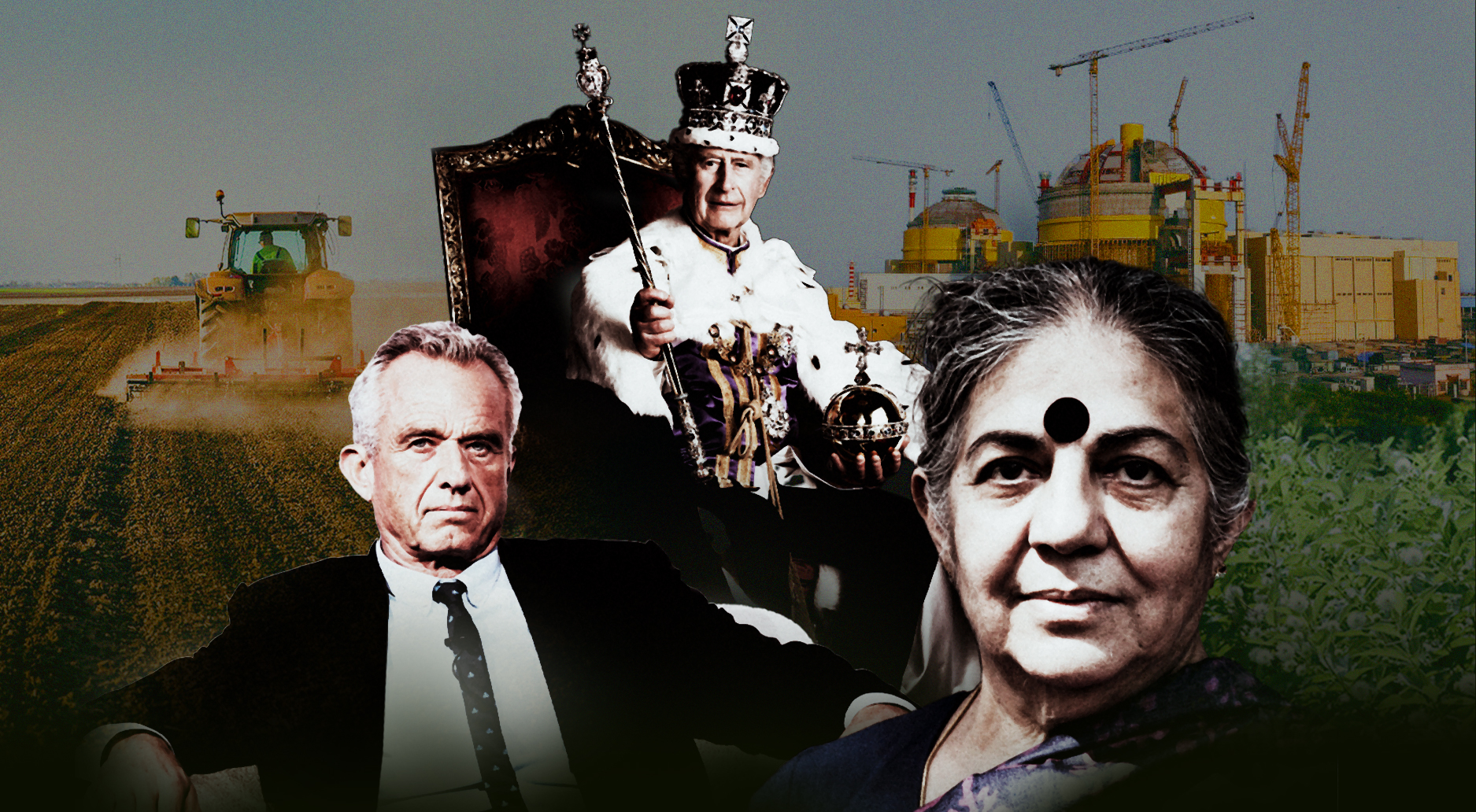
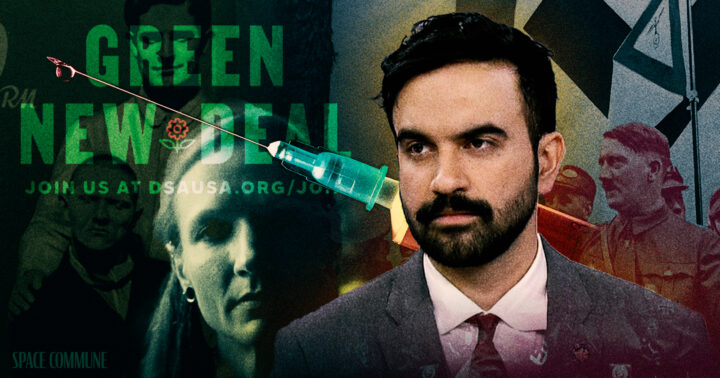
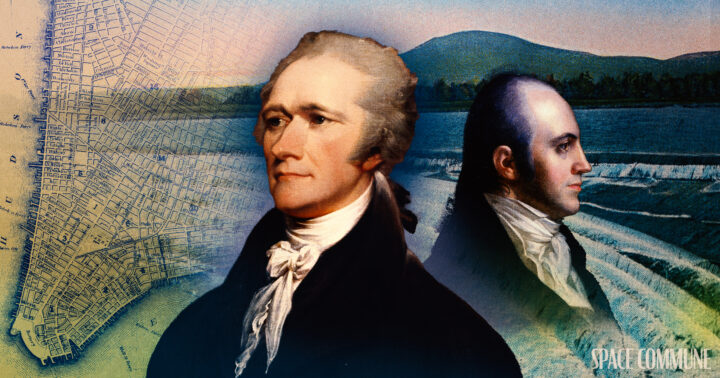

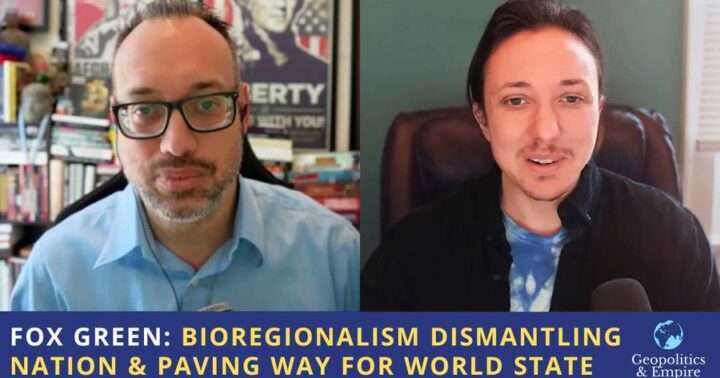
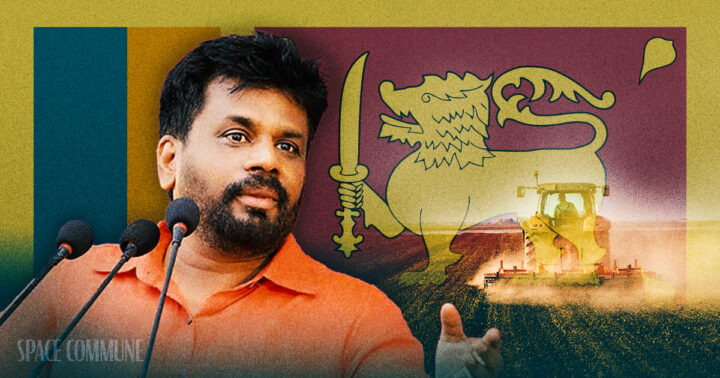
Speaking of Cuba:
“The bicycle is the most important means of transportation in Cuba. With the collapse of the Soviet Union in 1991, and the economic crisis that ensued , the Cuban government made available to its citizens several million Chinese-made bicycles. Bicycles outnumber motor vehicles, both on the rural highways and in the cities. Bikes are used to transport goods and it’s not unusual to see passengers on a bike, either on the rear rack or on the top tube–sometimes both!”
https://www.bicyclinglife.com/NewsAndViews/cuba.htm
And of China:
Curiously a few years ago Joe Bray-Ali the owner of the Flying Pigeon bicycle shop in LA tried to run for City Council in part on a “bike lanes can prevent gentrification” platform. “Flying Pigeon” refers to the bicycles that were common in China up until fairly recently as the country has largely become more urbanized and developed. His business imported those bicycles.
https://melmagazine.com/en-us/story/this-city-council-candidate-thinks-bike-lanes-will-solve-las-gentrification-issues
Joe Bray-Ali‘s campaign was cut short after he was revealed to have posted seedy content on social media site Voat. Typical of CA’s progressives and the LA Swamp politicians, some of the the comments were racist.
Even the LA Times rescinded their endorsement of him. https://www.latimes.com/opinion/editorials/la-ed-endorsement-recinded-bray-ali-20170427-story.html
I think this is why self-styled communists here in the West see how countries like Cuba and China have on bicycling and they think the two good hand in hand. “Communism is when everyone is poor” – and they endorse it! For what it’s worth, China had the fastest-growing car market in the world!
Great stuff here, and nicely tied together. I basically think Vandana is responsible for mass murder of humans and natural places, and I am glad to see the critique of RFK Jr. and all of his scientism BS.
I am not so sold on Russia and China stuff though- those governments are absolutely terrible. I do want to make sure we don’t hate on the people subject to those regimes though- much like us in the west, there are only limited things they can do to about it as individuals. I do think we should push to support any and all of the development initiatives that they try though, as getting people out of the mud should be an incredibly high priority for everyone.
Thank you, I’m glad you liked the piece and that we can agree on Shiva/RFK. Getting people out of poverty is the main goal, I also agree with you there!
Question: What do you think of Diane Sare? She’s the LaRouchean candidate for the state of New York, and being that you are in New York I was wondering what were your opinions of her? In with RFK JR? Where did she stand on Indian Point Nuclear?
I know Diane well – in fact, I knocked on some doors for her last election cycle! She was very vocally opposed to the closure of Indian Point. Had a great conversation with her on the Space Commune podcast last year: https://spacecommune.substack.com/p/ep-025-the-inalienable-rights-of-90f#details
Your essay is very well written but has me scratching my head. I do agree that the WEF’s move to reduce nitrogen is insane and the policy has destroyed Sri Lanka and other countries that are trying to implement it. I grow Cannabis and am well aware of plants dependency on Nitrogen, Phosphorus and Potassium. Reduce any one of these components, NPK, and you reduce yields. But I do find it strange that while you mention the India activist you don’t say much about the role of the World Economic Forum which is out to enslave the entire planet.
Where I vehemently disagree is your push for GMO farming — using genetically modified seeds (which is probably responsible for causing damage to the human gut biome) and the use of Glyphosate (which also causes disease). Of course GMO farming is also being pushed by the WEF, the UN and Corporate Agriculture. GMO farming also reduces the nutritional value of foods, destroys the micro organisms crucial for plant metabolism, destroys the arable land (e.g., soil) and much more. And today these globalists are pushing for introducing mRNA poisons into our fruits and vegetables just as they pushed to put fluoride into our water supplies. The fact is because of these practices the nutritional value of fruits and vegetables has been reduced by nearly 90 percent since GMO agriculture began in the 1990’s. We also badly need to replenish the soil with trace minerals etc. that have been depleted from farming itself.
I am an Anti-Globalist and am against the entire globalist strategy for a “Great Reset” being pushed by the UN, WEF, Blackrock and most global corporations — Open Borders, Digital ID’s, Digital Currency, Mass Censorship, Nitrogen reduction in farming, forced vaccination etc. If they prevail we become nothing more than slaves on a Globalist Plantation. Again my criticism of your essay is you don’t really identify the globalists as the primary promoters of GMO farming and Nitrogen reduction. Both are bad ideas. I would encourage you to read through my Substack essays to better understand my point of view.
https://brucecain.substack.com/
This is also worth a read:
The Great Reset Starts with Farms (07/19/2022)
Heads of state are embracing the World Economic Forum’s agricultural agenda. Will farmers be able to push back?
https://www.theamericanconservative.com/the-world-economic-forums-agricultural-revolution/
Thanks Bruce – I highly recommend listening to our podcast episode with Cynthia Chung, in which we discuss GMOs amongst many other things you might find interesting. https://spacecommune.substack.com/p/ep-034-there-are-no-limits-to-scientific-53e#details
Perhaps I was a bit harsh as you do seem to be like me: an Anti-Globalist. But when Cynthia talked about GMO terminator genetics you didn’t seem to know what that meant. It means Monsanto/Bayer genetically modified the seeds — using technologies like CRISPR — so you could not save seeds from the plants: obviously in order to make farmers dependent on buying more Monsanto seeds. They also modified the seeds to produce pesticides to kill insect predators. There are many papers raising the alarm that these endogenous pesticides — in the plants — are causing harm to the human gut biome resulting in disease.
Same can be said of the mRNA Covid-19 injections — which are not real vaccines by the older definition. Recently papers have come out saying that these injections are modifying our DNA, allowing the nanoparticles to enter the brain and causing untold harm and death. Worse yet Biden and other globalist leaders coerced the population to take this poison. I’m a health care analyst and also worked five years in medical research. While I believe in free choice I haven’t had a vaccine in over 50 years. I would NEVER take a mRNA injection and would caution other to refuse as well. But if I were still working, and supporting a family, I would have been forced to take the poison. From supporting lobotomies, to fluoride in the water, to sex changing herbicides the globalists have harmed the people again and again. Biden is supporting the WHO Pandemic Treaty which would give the WHO global authority to mandate future mRNA injections. It is patently insane.
So it is a good thing — we are both Anti-Globalists. My concern is that you are far to embracing of these technologies. It reminds me of the story of Adam and Eve. By all means eat from the fruit of knowledge but NEVER EVER manipulate the Tree of Life. Yes you can use CRISPR etc. to modify DNA . . . but you haven’t a foggy clue of the possible problems such meddling can create. Mendellian genetic modification is fine: we’ve been doing it for hundreds of years. CRISPR genetic modification is beyond the “pay grade” of any human and should be prohibited.
Frankly I would rather play my guitar and never write again. But I have grandchildren and will not allow for a “Great Reset” where we become nothing more than slaves on a Global Plantation. The most important part of my work is to get people to embrace the Anti-Globalist “Put People First” agenda which is intended to rip the globalist agenda out by the roots. When people go before their City Councils to demand the Illegals are sent back, or to demand an end to CRT/LGBTQ curriculums I will be encouraging them to say that they are just fighting one aspect of the globalist agenda and that they support most/all of the PPF agenda. I will leave a link that enumerates the planks of the PPF. I’d be interested to know what you think of this strategy. It may be our only hope and I used a similar strategy (1990 – 2018) to successfully legalize Cannabis. With Cannabis the strategy was to stage annual protests throughout the planet. The PPF strategy is a bit different as it will initially focus on local activism. We’re all in this together — every human on planet Earth. All of us is all we need.
There are no Limits to Scientific Abundance
https://www.youtube.com/watch?v=2M8DznE-5uo
You will find the planks to the PPF in this essay and I will soon create a single essay expanding on the PPF strategy.
=====
As I wrote this the emergency broadcast had already occurred and I don’t feel any symptoms of Marburg nor do I feel like I’m turning into a zombie. Perhaps there is a delayed response though I remain skeptical. At the same time there is no doubt that EMF radiation can activate dormant virus — regardless of being vaccinated or unvaccinated. From a larger perspective the globalist clusterfuck, which I have alluded to in previous essays, is moving forward unabated. And both the “forced vaccination” agenda and the expansion of 5G antennas are part of that globalist agenda.
Could the Nationwide Emergency Alert Test(10/04/2023) be used to activate the Marburg Virus creating a new Plandemic?
Could the test emit a frequency that activates viruses in those that got the mRNA injection?
https://brucecain.substack.com/p/could-the-nationwide-emergency-alert
=====
If you are interested we could do a podcast where I’d be more than happy to discuss my activism and the PPF agenda. My strategy did work with Cannabis legalization. I hope the PPF strategy will put an end to the demonic Globalist agenda in a similar way.
Thanks for your comments Bruce. I think the reason we disagree in some areas is because of the different axioms on which we operate. See this post for more details on that:
https://open.substack.com/pub/spacecommune/p/robert-kennedy-jr-is-anti-technology?r=2ikqc1&utm_medium=ios&utm_campaign=post
From your link:
“Rather than saying “the technology of this vaccine was used to harm rather than help humanity,” the conversation led by RFK Jr is that vaccine technology is inherently bad. Just as he believes energy technology (such as nuclear power) or agricultural technology (such as fertilizer or GMO) is also inherently bad.”
As I previously wrote I am against the globalists push to reduce Nitrogen as it ultimately means reducing food production. I am diametrically opposed to GMO farming for reasons I’ve already covered in a previous post to you.
In my view both mRNA injections and GMO farming are a misuse of technology. The activist from India at least understands that everything in the universe is connected . . . which is why we must be mindful when we think of interfering with these systems: whether that be manipulating plant genetics or introducing a DNA changing mRNA system into the human body. The fact you don’t know what terminator genes are — with regard to GMO seeds — is concerning. That is pretty basic stuff. Do you understand the dangers of CRISPR technology in the manipulation of human DNA? I hope so but your pro technology stance is concerning.
I am not a Luddite. My entire career was that of a Health Care Systems Analyst for goodness sakes. Thank god I’m now retired. The reason we have lost trust in our scientists, institutions etc. is because they don’t follow the science but rather the money. I helped author multiple NIH grants while in medical research. The problem is “science” has been hijacked by the globalists. For example if you challenge the Green Agenda you won’t get a federal grant. There is no Anthropogenic Climate Change. It is a big fat lie to use Climate Change, Carbon Taxes etc. to gain global control.
I rarely find anyone that I completely agree with whether that be Kazinsky or RFK. I certainly do not endorse the violence Kazinsky promulgated but his manifesto is quite interesting when you consider when it was written. I try to distill what I can from many, many people and sources. Sometimes even the idiots have something useful to share.
Did you read the essay containing the planks of the Put People First (PPF) agenda? What are your impressions? Would you do a podcast so we can discuss my agenda. If you are interested in doing a podcast on the PPF agenda I will be available. Otherwise I’ve other things to do.
I am familiar with the intellectual property enforcement tactics done by companies like Monsanto – I had never heard them referred to as suicide seeds before, which is why I asked what that was. I agree with you on the climate change scheme as a means of control. My work revolves around the ‘why’ of people who pursue such schemes, which is a much more philosophical and/or religious question. Why do some people want to reduce the population? Bottom line is that they see mankind as an animal that must be culled occasionally to adhere to their prescribed “rules of nature.”
You’re right that technology can be misused, but that does not mean we turn our backs on technology. Nuclear bombs were the worst evil unleashed on mankind. Nuclear energy is a miracle that promises poverty-ending abundance and the possibility of space exploration. Technology, whether it’s GMOs, vaccines or fuel for energy are neutral, how we decide to use it is what makes it good or evil.
So what is your view on the “Put People First” Anti-Globalist Agenda. At the end of the day this Globalist agenda must be stopped.